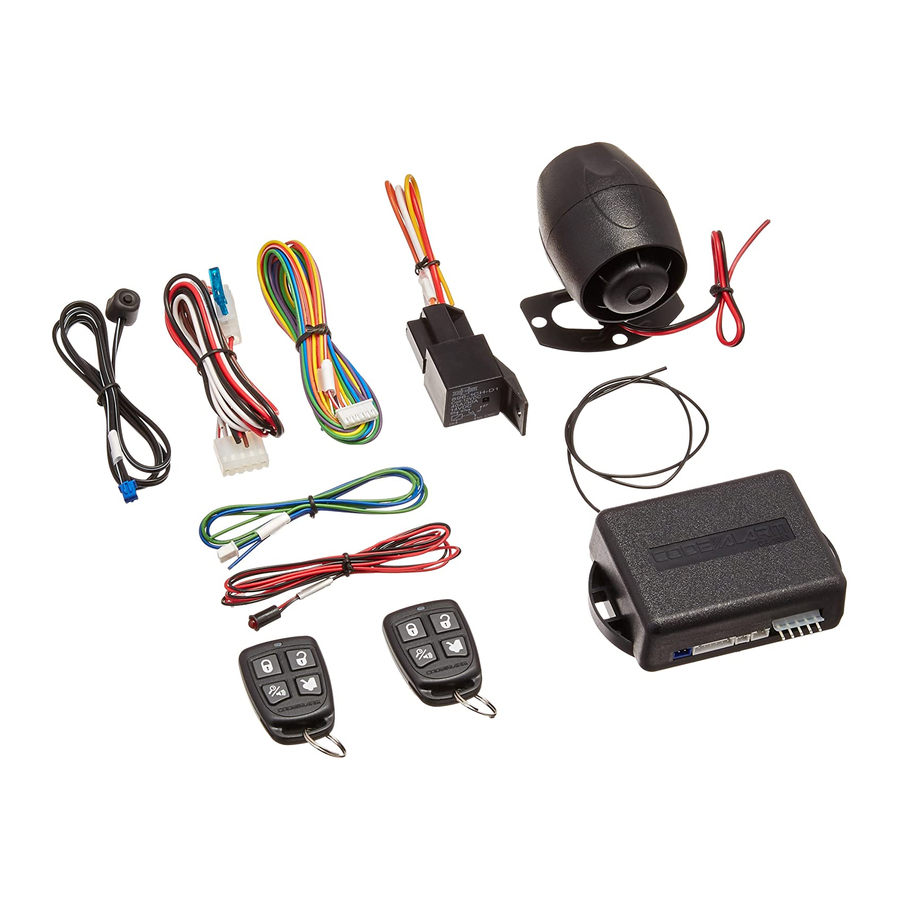Table of Contents
Advertisement
PROFESSIONAL
SERIES
ca 1053
Owner's Guide
Vehicle Security and
Keyless Entry System
IMPORTANT NOTE: The operation of the Security and Convenience System as described in this manual is
applicable to most vehicles. However, due to the configuration of some vehicles, some functions AND/OR
SAFETY PRECAUTIONS may not apply. Please see your installing dealer for more information.
1
2012 Audiovox Electronics Corporation. All rights reserved.
Advertisement
Table of Contents

Summary of Contents for Code Alarm CA 1053
-
Page 1: Keyless Entry System
PROFESSIONAL SERIES ca 1053 Owner’s Guide Vehicle Security and Keyless Entry System IMPORTANT NOTE: The operation of the Security and Convenience System as described in this manual is applicable to most vehicles. However, due to the configuration of some vehicles, some functions AND/OR SAFETY PRECAUTIONS may not apply. -
Page 2: Table Of Contents
Table of Contents Using Your Remote Control ..............3 Arming the Security System .............. 3 Passive Arming Bypass ..............3 Bypassing the Shock Sensor ............3 Hidden Alarm Function ..............3 Disarming the Security System ............3 Valet Mode ..................4 Manually Overriding the Security System ......... -
Page 3: Using Your Remote Control
Using Your Remote Control Arming the Security System To arm the system, exit the vehicle, close all doors, then press the button. The parking lights will flash 2 times, indicating the system is armed, has locked the doors (if equipped and connected) and activated the starter disable feature. The LED status indicator will blink steadily, once per second. -
Page 4: Valet Mode
Valet Mode When valet mode is activated the status LED will light solid, and all security functions will be disabled. To enter or exit valet mode simply follow the 4 steps outlined below: Turn the vehicle’s ignition ON. Push and hold the programming/valet button. The LED will turn on solid when valet mode is active Release the programming/valet button. -
Page 5: Using The Personal Protection Alarm
Using the Personal Protection Alarm (Panic) Press and hold the button for 3 seconds to activate the personal protection alarm. During panic mode, the normal function of the transmitter buttons will be suspended. The transmitter’s buttons can be used to lock and unlock the door (if the option is installed). -
Page 6: Led And Siren/Horn Indications
LED and Siren/Horn Indications LED Display Indications Function DISARMED SLOW FLASH ARMED FAST FLASH PASSIVE ARMING ON (SOLID) VALET MODE 2 FLASH... PAUSE ZONE 2 TRIGGER, HOOD/TRUNK 3 FLASH... PAUSE ZONE 3 TRIGGER, DOOR 4 FLASH... PAUSE ZONE 4 TRIGGER, SHOCK 5 FLASH... -
Page 7: Transmitter Button Functions
Transmitter Button Functions Car Find / Lock Unlock Trunk Operation Method Panic Lock Press and Release Unlock Press and Release Trunk Push and Hold (3 Sec) Car Finder Press and Release Panic Push and Hold (3 Sec) Press and Release Lock then Press Shock Bypass Lock + Car Find (within 5 Sec) Passive Arming... -
Page 8: Limited Lifetime Warranty
LIMITED LIFETIME WARRANTY Applies to Code Alarm Series Control Modules, Sirens, Sensors, and Relays. Voxx Electronics Corporation (the Company) warrants to the original purchaser of this product that should this product or any part thereof, (other than transmitters) under nor-... - Page 9 2012 Audiovox Electronics Corporation. All rights reserved.
-
Page 10: Customer Service
Audiovox Electronics Corporation. Customer Service 1-800-421-3209 WWW.CODE-ALARM.COM FCC COMPLIANCE This device complies with Part 15 of the FCC rules and with RSS-210 of Industry Canada. Operation is subject to the following two conditions: 1. This device may not cause harmful interference, and 2.












Need help?
Do you have a question about the CA 1053 and is the answer not in the manual?
Questions and answers